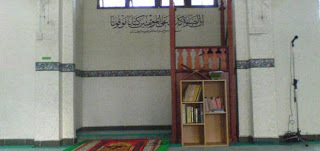His real name is Shaykh ‘Abdul Malik bin ‘Abdullah bin ‘Abdul Qahhar bin Sharif Muhammad al-Baghdadi. He is also known as Tok Sheh Pulau Manis, Tokku Pulau Manis, Tuan Pulau Manis, and Sharif ‘Abdul Malik.
Among the earliest family of da’wah to setle in Terengganu, his father lived in Kampung Pauh, Hulu Terengganu. His great-grandfather Sharif Muhammad bin ‘Abdullah had been of noble lineage from Baghdad, Iraq. He later moved to Makkah, then Acheh in North Sumatra, then to the Malay Peninsula, where he settled near Batu Belah, Kuala Berang, Hulu Terengganu.
Tok Pulau Manis was born in Kampung Pauh in 1650 AD (1060 AH). After an early education by his own father, he set out to Acheh and studied under the great Shaykh ‘Abdul Rauf Singkel. After a brief stint in Java, he continued his pursuit of knowledge in Makkah al-Mukarramah, the center for knowledge and worship. Arriving in 1681, he spent 10-12 years at the feet of various ulama including Shaykh Ibrahim bin Hassan bin Shihabuddin ash-Shafi’I al-Kurdi al-Kurani (successor of Shaykh Ahmad al-Qushashi).
His peers in Makkah include Haji Muhammad Soleh bin ‘Umar Semarani, Dato’ Syed Abdullah, Faqih ‘Abdul Qadir Palembang, Faqih ‘Abdul Rahman Fatoni, Faqih ‘Abdul Samad Kedah, Haji Ibrahim, and Haji Muhammad Siantan.
Deeply interested in tasawwuf, he studied the works of imams Ibn ‘Athoillah, al-Ghazali, Ibnul ‘Arabi, Abu Tholib al-Makki, al-Qushairi, Abu Nasr as-Siraj at-Thusi, Ibn ‘Abbad, Ahmad Zarruq and others. He chose the path of Shaziliyyah as his tariqah. He busied himself in the study of usuluddin in the creed of Ahlus Sunnah wal Jama’ah, in Shafi’I fiqh, tafsir, hadith, history, and various disciplines of Arabic language.
Apparently a cream of the crops among his peers, Tok Pulau Manis was requested to translate the famous Ibn ‘Athoillah’s Hikam to Malay. The fame of his Hikam translation reached the Malay Peninsula even before his return to native land in 1690. He started teaching Hikam in his own village, later in Kampung Batu Hampar, then moved downstream to his new residence in Kampung Pulau Manis.
Renowned as a wali of Allah, many students from all over the Peninsula came to study under him in Pulau Manis. The students built small huts for residence, hence the pondok (hut) system. After his passing, his pondok system was administered by his descendants, and saw relocation and expansion to Beladau, Sungai Rengas, Kampung Midin, and Kampung Aur Cina.
Tok Pulau Manis was famous among the masses as well as the nobles. Besides the public, Sultan Zainal ‘Abidin I and many of the palace chieftains also counted as his students. He was the official Shaykhul ‘Ulama and Mufti.
He left behind 3 religious works besides the sharah of Hikam:
- Kitab Kifayah on usuluddin and fiqh.
- Risalah Naqal on the number of congregants valid to make a Friday solah.
- Risalah Kaifiyyah an-Niyyah on fiqh and tasawwuf.
Wallahu a'lam








 Darul Uluoom Deoband
Darul Uluoom Deoband  If you happen to be in Langkawi, look for Imam Mohammed Khaled of Masjid India (Riadhul ‘Abidin) in Kuah town. Make a visit to this man, maybe there is something good Allah will bestow you.
If you happen to be in Langkawi, look for Imam Mohammed Khaled of Masjid India (Riadhul ‘Abidin) in Kuah town. Make a visit to this man, maybe there is something good Allah will bestow you. 




